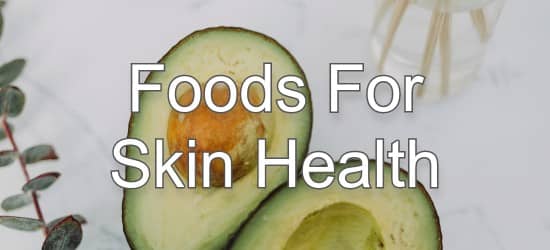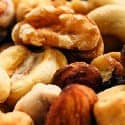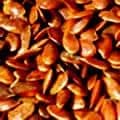12 Delicious Foods to Support Skin Health

The skin is the largest organ of the body and serves to protect our body, regulate temperature, and manufacture vitamin D.
The health of your skin depends on the nutrients it receives. Feeding your skin from the inside is much more beneficial than any cream or beauty treatment you can buy.
Foods that promote skin health include oily fish, pomegranates, avocados, orange vegetables, turmeric, berries, nuts, fermented foods, chocolate, watermelon, spirulina, and seeds. Making these foods a regular part of your diet will give your skin an extra boost of nutrients and keep it healthy.
12 Foods to Support Healthy Skin
-
 1. Oily Fish (Salmon) + Add
Salmon and other oily fish are well known for being a top source of omega-3 fats. Omega 3 fats have strong anti-inflammatory effects and show promise for many cosmetic and therapeutic effects on the skin. (1) Pink fish such as salmon and trout contain a carotenoid pigment (from the same family as beta-carotene) called astaxanthin that has been shown in studies to reduce wrinkles and age spots and improve skin texture and elasticity. (2) Salmon is also a great source of skin essentials selenium and protein.
1. Oily Fish (Salmon) + Add
Salmon and other oily fish are well known for being a top source of omega-3 fats. Omega 3 fats have strong anti-inflammatory effects and show promise for many cosmetic and therapeutic effects on the skin. (1) Pink fish such as salmon and trout contain a carotenoid pigment (from the same family as beta-carotene) called astaxanthin that has been shown in studies to reduce wrinkles and age spots and improve skin texture and elasticity. (2) Salmon is also a great source of skin essentials selenium and protein.
Nutrition Facts for Cooked Atlantic Salmon (Farmed). -
 2. Pomegranate + Add
Pomegranates contain substances called punicalagins, which have potent antioxidant and anti-inflammatory effects. Both oxidative stress and inflammation contribute to skin damage and aging. One study found that pomegranate extract can protect skin fibroblast cells (the ones that produce collagen) against damage and death from UVA and UVB rays. (3) Pomegranates are also an excellent source of vitamin C, which promotes healthy collagen. (4)
2. Pomegranate + Add
Pomegranates contain substances called punicalagins, which have potent antioxidant and anti-inflammatory effects. Both oxidative stress and inflammation contribute to skin damage and aging. One study found that pomegranate extract can protect skin fibroblast cells (the ones that produce collagen) against damage and death from UVA and UVB rays. (3) Pomegranates are also an excellent source of vitamin C, which promotes healthy collagen. (4)
Nutrition Facts for Pomegranates. -
3. Avocados + Add
Avocados are a top source of vitamin E, an antioxidant that protects the skin from the aging effects of free radicals. (5) Avocados are also a great source of healthy monounsaturated fats and antioxidants, including carotenoids, both of which have been linked with improving skin health and appearance. (6)
Nutrition Facts for Avocados. -
 4. Orange Vegetables + Add
Orange vegetables such as carrots, butternut squash, pumpkin and sweet potatoes contain particularly high levels of beta-carotene. Beta-carotene is converted in the body to vitamin A, an essential nutrient for skin health and maintenance. (7) Vitamin A also influences the ability of the skin to withstand environmental damage and helps prevent collagen breakdown. (7) Beta-carotene itself has antioxidant effects and can help build up natural protection against the sun and reduce sun damage to the skin. (8,9)
4. Orange Vegetables + Add
Orange vegetables such as carrots, butternut squash, pumpkin and sweet potatoes contain particularly high levels of beta-carotene. Beta-carotene is converted in the body to vitamin A, an essential nutrient for skin health and maintenance. (7) Vitamin A also influences the ability of the skin to withstand environmental damage and helps prevent collagen breakdown. (7) Beta-carotene itself has antioxidant effects and can help build up natural protection against the sun and reduce sun damage to the skin. (8,9)
*Foods only offer relatively weak protection against sun damage and should never be a substitute for sunscreen and safe sun exposure, rather they should be an additional supportive measure.
Nutrition Facts for Cooked Carrots (Boiled, Drained). -
 5. Turmeric + Add
Turmeric contains a substance called curcumin, which has potent anti-inflammatory and antioxidant properties. (10) Its anti-inflammatory effects are beneficial for calming skin irritation such as acne flare-ups and in India turmeric is commonly used in facemasks. Turmeric also helps protect skin against aging, as it not only acts as an antioxidant itself but also boosts the activity of the body's own antioxidant enzymes, so its actions against free radicals are two-fold. (11) In addition, turmeric supports liver detoxification enzymes, which have benefits for the skin and overall health. (12,13)
5. Turmeric + Add
Turmeric contains a substance called curcumin, which has potent anti-inflammatory and antioxidant properties. (10) Its anti-inflammatory effects are beneficial for calming skin irritation such as acne flare-ups and in India turmeric is commonly used in facemasks. Turmeric also helps protect skin against aging, as it not only acts as an antioxidant itself but also boosts the activity of the body's own antioxidant enzymes, so its actions against free radicals are two-fold. (11) In addition, turmeric supports liver detoxification enzymes, which have benefits for the skin and overall health. (12,13)
Nutrition Facts for Ground Turmeric. -
 6. Berries + Add
Berries are rich in flavonoids, a type of antioxidant that protects the skin against free radical damage and aging. (14) Strawberries, in particular, are also an excellent source of vitamin C, with 1 cup providing more than 100% of the RDA. Vitamin C is found in high levels in both the dermis and epidermis of the skin, where it has an essential role in collagen production. (4) Collagen is the main structural protein of the skin, which keeps it strong, supple, and firm; its decline as we age causes skin wrinkling. Aging and UV light can lower the vitamin C content of the skin, so the more we get in our diets the better. (15)
6. Berries + Add
Berries are rich in flavonoids, a type of antioxidant that protects the skin against free radical damage and aging. (14) Strawberries, in particular, are also an excellent source of vitamin C, with 1 cup providing more than 100% of the RDA. Vitamin C is found in high levels in both the dermis and epidermis of the skin, where it has an essential role in collagen production. (4) Collagen is the main structural protein of the skin, which keeps it strong, supple, and firm; its decline as we age causes skin wrinkling. Aging and UV light can lower the vitamin C content of the skin, so the more we get in our diets the better. (15)
Nutrition Facts for Blackberries. -
 7. Nuts + Add
Nuts are one of the most nutrient-dense foods, being a top source of healthy fats, antioxidants, vitamin E, plant protein, and a host of beneficial phytochemicals. Nuts have anti-inflammatory and antioxidant actions, which both help prevent skin aging. Nuts, especially Brazil nuts, are also a top source of the mineral selenium which can help reduce skin aging and possibly even reduce the risk of more serious skin damage. (16) Low levels of selenium are associated with a host of skin diseases including psoriasis, acne vulgaris, chloric acne, and atopic dermatitis. (17) Consuming too much selenium, however, is also dangerous as high levels of selenium also increased the severity of psoriasis and can even increase the risk of certain skin cancers. (17,18) Foods high in selenium are best for maintaining healthy selenium levels while avoiding selenium supplements.
7. Nuts + Add
Nuts are one of the most nutrient-dense foods, being a top source of healthy fats, antioxidants, vitamin E, plant protein, and a host of beneficial phytochemicals. Nuts have anti-inflammatory and antioxidant actions, which both help prevent skin aging. Nuts, especially Brazil nuts, are also a top source of the mineral selenium which can help reduce skin aging and possibly even reduce the risk of more serious skin damage. (16) Low levels of selenium are associated with a host of skin diseases including psoriasis, acne vulgaris, chloric acne, and atopic dermatitis. (17) Consuming too much selenium, however, is also dangerous as high levels of selenium also increased the severity of psoriasis and can even increase the risk of certain skin cancers. (17,18) Foods high in selenium are best for maintaining healthy selenium levels while avoiding selenium supplements.
Nutrition Facts for Brazilnuts. -
 8. Fermented Foods (Kimchi, Sauerkraut) + Add
Sauerkraut contains live probiotics, beneficial bacteria with far-reaching effects on health including skin health. A Korean study found that 12 weeks of supplementation with probiotics boosted skin elasticity and hydration and reduced wrinkle depth. (19) Fermented foods such as sauerkraut (fermented cabbage), kimchi (fermented vegetables with spices), and kombucha (fermented tea) are some of the healthiest sources of probiotics.
8. Fermented Foods (Kimchi, Sauerkraut) + Add
Sauerkraut contains live probiotics, beneficial bacteria with far-reaching effects on health including skin health. A Korean study found that 12 weeks of supplementation with probiotics boosted skin elasticity and hydration and reduced wrinkle depth. (19) Fermented foods such as sauerkraut (fermented cabbage), kimchi (fermented vegetables with spices), and kombucha (fermented tea) are some of the healthiest sources of probiotics.
Nutrition Facts for Kimchi. -
 9. Chocolate + Add
A study found that supplementation with cocoa had positive effects on skin elasticity and wrinkle reduction in women aged 43-86. (20) Other studies have demonstrated reductions in UVB-induced wrinkle formation and collagen degradation following the consumption of cacao powder, with evidence indicating that cocoa may alter the expression of genes linked to skin wrinkling. (21) This is not surprising, as raw cacao is one of the richest sources of antioxidants of all foods, being particularly high in a type of antioxidant called flavanols.
9. Chocolate + Add
A study found that supplementation with cocoa had positive effects on skin elasticity and wrinkle reduction in women aged 43-86. (20) Other studies have demonstrated reductions in UVB-induced wrinkle formation and collagen degradation following the consumption of cacao powder, with evidence indicating that cocoa may alter the expression of genes linked to skin wrinkling. (21) This is not surprising, as raw cacao is one of the richest sources of antioxidants of all foods, being particularly high in a type of antioxidant called flavanols.
Nutrition Facts for Dark Chocolate (70-85% Cocoa). -
 10. Watermelon + Add
This juicy and tasty fruit is a top source of lycopene. Lycopene is an antioxidant linked with many health benefits including protecting the skin against free radical damage and UV damage, which are the two top causes of skin aging. (22) Its high water content (92% water) also makes it a great hydrator, especially in hot weather or post-exercise. In addition, watermelon is a good source of vitamins A and C.
10. Watermelon + Add
This juicy and tasty fruit is a top source of lycopene. Lycopene is an antioxidant linked with many health benefits including protecting the skin against free radical damage and UV damage, which are the two top causes of skin aging. (22) Its high water content (92% water) also makes it a great hydrator, especially in hot weather or post-exercise. In addition, watermelon is a good source of vitamins A and C.
Nutrition Facts for Watermelon. -
 11. Spirulina + Add
Spirulina is a blue-green algae, sometimes referred to as a "complete food" as it provides all the essential nutrients our bodies need including protein, essential fats, vitamins, minerals, and antioxidants. Spirulina contains a type of essential fat called GLA, which has anti-inflammatory effects and may help calm inflammatory skin conditions. (23,24) There is also some evidence that spirulina can stimulate the cells in the body that produce collagen, called fibroblasts. (25)
11. Spirulina + Add
Spirulina is a blue-green algae, sometimes referred to as a "complete food" as it provides all the essential nutrients our bodies need including protein, essential fats, vitamins, minerals, and antioxidants. Spirulina contains a type of essential fat called GLA, which has anti-inflammatory effects and may help calm inflammatory skin conditions. (23,24) There is also some evidence that spirulina can stimulate the cells in the body that produce collagen, called fibroblasts. (25)
Nutrition Facts for Raw Spirulina. -
 12. Seeds + Add
Seeds provide vitamin B3 (Niacin), an essential vitamin needed for keeping skin healthy. This water-soluble vitamin helps the epidermis (upper layer) of the skin retain moisture. This helps skin appear smoother with less dryness and can even reduce the appearance of wrinkles. (26) Niacin is also used topically as a treatment for acne. (26) Seeds are also a great source of zinc, needed for healing and repair in the body, including skin healing, healing of blemishes, and preventing scar formation. Clinical trials have shown that zinc supplements can also reduce the severity of acne. (27)
12. Seeds + Add
Seeds provide vitamin B3 (Niacin), an essential vitamin needed for keeping skin healthy. This water-soluble vitamin helps the epidermis (upper layer) of the skin retain moisture. This helps skin appear smoother with less dryness and can even reduce the appearance of wrinkles. (26) Niacin is also used topically as a treatment for acne. (26) Seeds are also a great source of zinc, needed for healing and repair in the body, including skin healing, healing of blemishes, and preventing scar formation. Clinical trials have shown that zinc supplements can also reduce the severity of acne. (27)
Nutrition Facts for Flax Seeds.
More Tips for Maintaining Healthy Skin
- Exercise increases circulation - Improving blood flow and nutrient delivery to the skin. The health of your skin is completely dependent on the nutrients it receives this way. (28)
- Reduce stress and get a good night's sleep - Stress increases collagen breakdown in the body and sleep is when your skin regenerates and repairs itself. Women who sleep less than 5 hours have more fine lines, poorer skin elasticity, and skin that takes longer to recover from environmental stressors. (29)
- Limit sun exposure - A tan may give you a healthy glow in the short-term, but UV rays break down collagen and hyaluronic acid in the skin and cause premature aging in the long run. (30)
- Avoid refined sugars - Eating refined sugar can lead to skin damage. When your blood sugar spikes, the extra sugar reacts with body tissues, including collagen and elastin, it leads to the formation of aptly named AGEs (advanced glycation end-products). These cause cells to become stiff, losing their elasticity and becoming more prone to damage and premature aging. (31)
Related
Data Sources and References
- Engström K, Saldeen AS, Yang B, Mehta JL, Saldeen T. Cosmetic and Therapeutic Applications of Fish Oil's Fatty Acids on the Skin Ups J Med Sci. 2009;114(4):206-13. doi: 10.3109/03009730903268958. 19961266
- Ascher B, Rzany BJ, Grover R. Cosmetic benefits of astaxanthin on humans subjects Dermatol Surg. 2009 Oct;35(10):1478-86. doi: 10.1111/j.1524-4725.2009.01261.x. Epub 2009 Jul 20. 19686365
- Park HM, Moon E, Kim AJ, Kim MH, Lee S, Lee JB, Park YK, Jung HS, Kim YB, Kim SY. Protective effects of standardized pomegranate (Punica granatum L.) polyphenolic extract in ultraviolet-irradiated human skin fibroblasts Int J Dermatol. 2010 Mar;49(3):276-82. doi: 10.1111/j.1365-4632.2009.04269.x. 20465664
- Lai WC, Iglesias BC, Mark BJ, Wang D. Efficacy of Vitamin C Supplementation on Collagen Synthesis and Oxidative Stress After Musculoskeletal Injuries: A Systematic Review Arthroscopy. 2021 Jul;37(7):2318-2333.e3. doi: 10.1016/j.arthro.2021.02.019. Epub 2021 Feb 20. 33621647
- Miyachi Y. The role of vitamin E in normal and damaged skin J Dermatol Sci. 1995 Mar;9(2):79-86. doi: 10.1016/0923-1811(94)00363-j. 7772578
- Ledikwe JH, Blanck HM, Khan LK, Serdula MK, Seymour JD, Tohill BC, Rolls BJ. Association of dietary fat, vegetables and antioxidant micronutrients with skin ageing in Japanese women J Am Diet Assoc. 2006 Aug;106(8):1172-80. doi: 10.1016/j.jada.2006.05.013. 16863711
- Nezzar H, Chiambaretta F, Marceau G, Blanchon L, Faye B, Dechelotte P, Rigal D, Sapin V. Retinoids: active molecules influencing skin structure formation in cosmetic and dermatological treatments Mol Vis. 2007 Sep 11;13:1641-50. 17893666
- Stahl W, Heinrich U, Aust O, Tronnier H, Sies H. Photoprotection by dietary carotenoids: concept, mechanisms, evidence and future development Photochem Photobiol Sci. 2006 Feb;5(2):238-42. doi: 10.1039/b505312a. Epub 2005 Aug 12. 16465309
- Stahl W, Heinrich U, Aust O, Tronnier H, Sies H. β-Carotene and other carotenoids in protection from sunlight Photochem Photobiol Sci. 2006 Feb;5(2):238-42. doi: 10.1039/b505312a. Epub 2005 Aug 12. 16465309
- Aggarwal BB, Sundaram C, Malani N, Ichikawa H. Antioxidant and anti-inflammatory properties of curcumin Adv Exp Med Biol. 2007;595:1-75. doi: 10.1007/978-0-387-46401-5_1. 17569205
- Thangapazham RL, Sharma A, Maheshwari RK. Skin regenerative potentials of curcumin Adv Exp Med Biol. 2007;595:343-57. doi: 10.1007/978-0-387-46401-5_15. 17569219
- Panahi Y, Kianpour P, Mohtashami R, Jafari R, Simental-MendÃa LE, Sahebkar A. Treatment of Non-alcoholic Fatty Liver Disease with Curcumin: A Randomized Placebo-controlled Trial Drug Res (Stuttg). 2017 Apr;67(4):244-251. doi: 10.1055/s-0043-100019. Epub 2017 Feb 3. 28158893
- Bhandari A, Mahajan R. Cutaneous manifestations of common liver diseases J Clin Exp Hepatol. 2022 Jul-Aug;12(4):1215-1224. doi: 10.1016/j.jceh.2021.12.013. Epub 2021 Dec 28. 35814509
- Stahl W, Heinrich U, Aust O, Tronnier H, Sies H. Carotenoids and flavonoids contribute to nutritional protection against skin damage from sunlight Photochem Photobiol Sci. 2006 Feb;5(2):238-42. doi: 10.1039/b505312a. Epub 2005 Aug 12. 16465309
- Chung JH, Seo JY, Choi HR, Lee MK, Youn CS, Rhie G, Cho KH, Kim KH, Park KC, Eun HC. Aging- and photoaging-dependent changes of enzymic and nonenzymic antioxidants in the epidermis and dermis of human skin in vivo J Invest Dermatol. 2001 Nov;117(5):1218-24. doi: 10.1046/j.0022-202x.2001.01544.x. 11710936
- Jones VA, Patel PM, Wilson C, Wang H, Ashack KA. Selenium levels and skin diseases: systematic review and meta-analysis JAAD Int. 2020 Dec 26;2:76-93. doi: 10.1016/j.jdin.2020.11.001. eCollection 2021 Mar. 34409356
- Huff J. Selenium supplementation and secondary prevention of nonmelanoma skin cancer in a randomized trial J Natl Cancer Inst. 2004 Feb 18;96(4):333-4; author reply 334. doi: 10.1093/jnci/djh050. 14970283
- Jones VA, Patel PM, Wilson C, Wang H, Ashack KA. Selenium levels and skin diseases: systematic review and meta-analysis JAAD Int. 2020 Dec 26;2:76-93. doi: 10.1016/j.jdin.2020.11.001. eCollection 2021 Mar. 34409356
- Ra J, Lee DE, Kim SH, Jeong JW, Ku HK, Kim TY, Choi ID, Jeung W, Sim JH, Ahn YT. Clinical Evidence of Effects of Lactobacillus plantarum HY7714 on Skin Aging: A Randomized, Double Blind, Placebo-Controlled Study J Microbiol Biotechnol. 2014 Dec 28;24(12):1736-43. doi: 10.4014/jmb.1408.08023. 25179898
- Mastroiacovo D, Kwik-Uribe C, Grassi D, Necozione S, Raffaele A, Pistacchio L, Righetti R, Bocale R, Lechiara MC, Marini C, Ferri C, Desideri G. Cocoa Flavanol Supplementation Influences Skin Conditions of Photo-Aged Women: A 24-Week Double-Blind, Randomized, Controlled Trial Am J Clin Nutr. 2015 Mar;101(3):538-48. doi: 10.3945/ajcn.114.092189. Epub 2014 Dec 17. 25733639
- Choi SH, Choi SI, Jung TD, Cho BY, Lee JH, Kim SH, Yoon SA, Ham YM, Yoon WJ, Cho JH, Lee OH. Oral Supplementation with Cocoa Extract Reduces UVB-Induced Wrinkles in Hairless Mouse Skin Int J Mol Sci. 2017 Sep 25;18(10):2052. doi: 10.3390/ijms18102052. 28946661
- Sies H, Stahl W. Lycopene-rich products and dietary photoprotection Photochem Photobiol Sci. 2004 Aug;3(8):749-52. doi: 10.1039/b316082c. Epub 2004 Apr 1. 15295630
- El Baky HHA, El Baroty GS, Mostafa EM. Culture Conditions stimulating high γ-Linolenic Acid accumulation by Spirulina platensis Recent Pat Food Nutr Agric. 2020;11(1):40-48. doi: 10.2174/2212798410666181227125229. 30588890
- van Gool CJ, Thijs C, Henquet CJ, van Houwelingen AC, Dagnelie PC, Schrander J, Menheere PP, van den brandt PA. Dietary supplementation of gamma-linolenic acid improves skin parameters in subjects with dry skin and mild atopic dermatitis Am J Clin Nutr. 2003 Apr;77(4):943-51. doi: 10.1093/ajcn/77.4.943. 12663296
- Liu P, Choi JW, Lee MK, Choi YH, Nam TJ. Crude protein from spirulina increases the viability of CCD‑986sk cells via the EGFR/MAPK signaling pathway Int J Mol Med. 2020 Jul;46(1):351-359. doi: 10.3892/ijmm.2020.4571. Epub 2020 Apr 8. 32319537
- Jacobson EL, Kim H, Kim M, Williams JD, Coyle DL, Coyle WR, Grove G, Rizer RL, Stratton MS, Jacobson MK. Nicotinic acid/niacinamide and the skin Exp Dermatol. 2007 Jun;16(6):490-9. doi: 10.1111/j.1600-0625.2007.00553.x. 17518989
- Searle T, Ali FR, Al-Niaimi F. Serum zinc levels and efficacy of zinc treatment in acne vulgaris: A systematic review and meta-analysis J Dermatolog Treat. 2022 Aug;33(5):2455-2458. doi: 10.1080/09546634.2022.2062282. Epub 2022 Apr 18. 35437093
- Kang C, Chung E, Diffee G, Ji LL. Exercise-stimulated interleukin-15 is controlled by AMPK and regulates skin metabolism and aging Exp Gerontol. 2013 Nov;48(11):1343-50. doi: 10.1016/j.exger.2013.08.004. Epub 2013 Aug 30. 23994518
- Hung HC, Lu FH, Ou HY, Wu JS, Yang YC, Chang CJ. Does poor sleep quality affect skin ageing? Menopause. 2014 Aug;21(8):834-9. doi: 10.1097/GME.0000000000000183. 24398409
- Röck K, Fischer JW. Natural and sun-induced aging of human skin Hautarzt. 2011 Aug;62(8):591-7. doi: 10.1007/s00105-011-2133-x. 21681543
- Danby FW. Sugar Sag: Glycation and the Role of Diet in Aging Skin Clin Dermatol. 2010 Jul-Aug;28(4):409-11. doi: 10.1016/j.clindermatol.2010.03.018. 20620757
Simplify Nutrition Tracking with MyFoodData!
Speedy Tools and Detailed Data FREEEasily analyze your meals to find the best foods for your goals.
✅ Use our recipe nutrition calculator and nutrition comparison tool.
✅ Access expert nutrition data tools and in-depth articles.
✅ Log foods and organize your recipes with a free account.


 Next ➞
Next ➞
